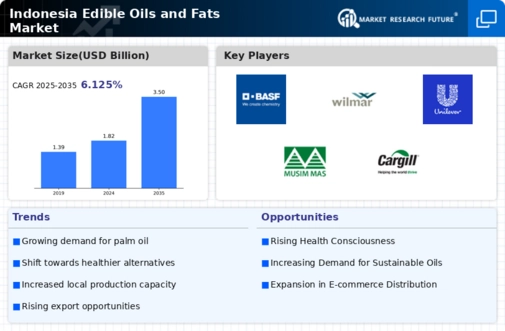Rising Demand for Cooking Oils
The edible oils-fats market in Indonesia experiences a notable increase in demand for cooking oils, driven by the growing population and urbanization. As more households adopt modern cooking practices, the consumption of various oils, such as palm oil and soybean oil, rises significantly. In 2025, the market is projected to reach approximately $5 billion, reflecting a compound annual growth rate (CAGR) of around 6%. This trend indicates a shift towards convenience and ready-to-use cooking solutions, which further propels the growth of the edible oils-fats market. Additionally, the increasing popularity of fried foods and traditional Indonesian dishes contributes to the sustained demand for cooking oils, making it a crucial driver in the industry.
Expansion of Food Processing Sector
The food processing sector in Indonesia plays a pivotal role in shaping the edible oils-fats market. With the rise of food manufacturing and processing companies, the demand for high-quality edible oils is on the rise. In 2025, the food processing industry is expected to contribute significantly to the overall market, with an estimated value of $3 billion. This growth is attributed to the increasing consumption of packaged and processed foods among urban consumers. As manufacturers seek to enhance the flavor and shelf life of their products, the need for various edible oils becomes essential. Consequently, this expansion in the food processing sector serves as a vital driver for the edible oils-fats market.
Government Policies and Regulations
Government policies and regulations in Indonesia significantly influence the edible oils-fats market. The government has implemented various initiatives to promote the use of locally sourced oils, particularly palm oil, which is a major export product. In 2025, the government aims to increase the domestic consumption of palm oil by 10%, thereby supporting local farmers and boosting the economy. Additionally, regulations regarding food safety and quality standards compel manufacturers to adhere to stringent guidelines, ensuring that the oils produced meet consumer expectations. These policies not only enhance the reputation of the edible oils-fats market but also encourage sustainable practices within the industry.
Consumer Preferences for Natural Oils
In recent years, there has been a noticeable shift in consumer preferences towards natural and organic oils in Indonesia. The edible oils-fats market is witnessing a growing trend where consumers are increasingly opting for oils that are perceived as healthier and more natural. This shift is reflected in the rising sales of coconut oil and olive oil, which are often marketed as healthier alternatives. In 2025, the market for natural oils is projected to grow by 15%, indicating a strong consumer inclination towards products that align with health and wellness trends. This evolving preference is likely to reshape the product offerings within the edible oils-fats market, pushing manufacturers to innovate and diversify their portfolios.
Technological Advancements in Oil Extraction
Technological advancements in oil extraction processes are transforming the edible oils-fats market in Indonesia. Innovations such as cold-press extraction and refining techniques enhance the quality and yield of oils, making them more appealing to consumers. In 2025, the adoption of advanced extraction technologies is expected to increase production efficiency by 20%, thereby reducing costs and improving profit margins for manufacturers. These advancements not only contribute to the overall growth of the edible oils-fats market but also enable producers to meet the rising demand for high-quality oils. As technology continues to evolve, it is likely to play a crucial role in shaping the future landscape of the industry.
















Leave a Comment